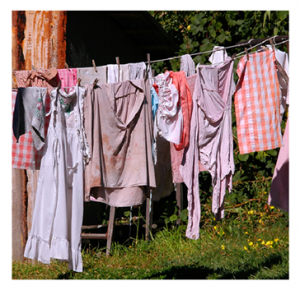Reputation. Is it old hat? Is “public perception” of who we are and what we stand for of any importance these days?
 Surely, our standards of what is acceptable have expanded — sexting and selfies have seen to that, though whether we think this is appropriate behavior for adults is another issue altogether.
Surely, our standards of what is acceptable have expanded — sexting and selfies have seen to that, though whether we think this is appropriate behavior for adults is another issue altogether.
So tell me. If we’re facing the possibility of a job interview, a new client presentation, or a first date with a hot prospect, are we less concerned with our digital footprint than we would’ve been five years ago?
With a stranger or casual acquaintance, are we more likely to flash a blinding smile, offer an impish shrug, toss out an engaging line — and assume that any innocuous misdeeds will quickly be discounted?
Should we be more concerned with our behavior than we seem to be these days? Is this always a matter of context? And online, specifically, what about acquiring bad habits when it comes to revealing too much, speaking too carelessly, or pushing the ENTER or POST button before assessing possible fallout?
Reputation. What Does It Mean?
What is reputation, exactly?
Merriam-Webster defines reputation this way:
… overall quality or character as seen or judged by people in general; recognition by other people of some characteristic or ability… good name…
Doesn’t a company reputation mean a great deal to prospects and customers? To potential investors? To potential employees and partners? Isn’t that precisely the same for a person?
Think how easy it is to make a statement in the online world — whether it’s true, false, or misleading. Once it’s out there, it becomes “permanent” gossip.
Now, most of us just have to grin and bear it. If we write or conduct business online, we learn to ignore most of the negativity. Besides, we don’t have the assets, the time, or the energy to go after those who may cause us damage. Yet imagine the impact of vicious remarks or mockery on those with thinner skin. Even if they don’t produce more than momentary discomfort, can’t they still deeply offend our families, and potentially influence our professional lives?
I recall one individual I worked with a number of years ago. He was at the mercy of a complete stranger who made erroneous claims about him online. Those claims had zero basis in fact, having originated in misplaced emotion, misunderstanding, and an absence of relevant information.
What was required to contain the mess?
Delicate interpersonal handling — offline.
A Little Discretion Goes a Long Way
I strongly believe that we are wise to use discretion, wise to be uber-careful, wise to listen to our gut, and wise to pay attention to issues of privacy and cybersecurity, as lucidly articulated in this Huff Post column by Adam Levin. Being hacked and having to clean up after is yet another blemish — or at least glitch — in one’s personal or professional reputation.
In addition to explicit recommendations for how to keep our data safe, Mr. Levin points out the many behavioral changes we could make that are in our own best interest. Among them:
… Try to break yourself of the habit of sharing every waking thought; special life moment; the itinerary of your family vacation; the picture of your new credit card and license or selfie with your newest car, diamond ring or piece of art… or, play-by-play of every bar or restaurant you are patronizing on any given night with everyone in your Twitterverse or Facebook community.
Hello? This isn’t only about reputation. It’s about safety!
I recall being on the online-dating-go-round some years back, and routinely using Google to do a quick screen of anyone who asked me out. I also used Facebook if I saw cause for further inquiry. One man, in particular, was mentioned a slew of times in accusations of sexual harassment. Were those claims and complaints true? Was it the act of a disgruntled subordinate?
Like Pretty Woman Says: “I’m a Safety Girl”
Was I going to meet up with a man who appeared to disrespect women after finding complaints about him online?
 Even if the plan was to meet in a public place, I wasn’t about to accept an invite from a man I didn’t know who might be capable of the behavior described.
Even if the plan was to meet in a public place, I wasn’t about to accept an invite from a man I didn’t know who might be capable of the behavior described.
Was it fair? Probably not. And even a phone call with him as he tried to explain was not enough to change my mind.
While we’re on the subject, what else turns me off in potential dates?
Seeing anyone bad-mouth an ex on their social media feeds. All the more reason for that essential rule: Don’t air your dirty laundry on the Internet!
The public may have the attention span of a gnat these days, but we also have Google at our fingertips — and a whole lot more. For better or worse, reputations can be made, lost, pummeled, enriched, bruised, bent, and then repaired again. A reasonable person understands this, uses judgment, and recognizes how vulnerable a “good” reputation is these days, especially with the veil of anonymity that is so easy to put in place.
Likewise, an organizational spokesperson, a potential employer, a future stockholder, and others are equally aware — of so many temptations (that we may all fall prey to), of a fickle and damning public (that can’t read beyond a topic sentence), and of the many vehicles at our disposal for intermixing private and public matters where we shouldn’t, taking words out of context, and putting reputation dangerously at risk.
You May Also Enjoy
“Seeing anyone bad-mouth an ex on their social media feeds….”
This has always mystified me, it really says much more about you than the other person. As the saying goes – When you point a finger at someone else, you point three back at yourself.
And then there is the one about holding on to bad feelings – It is like holding poison in your mouth and expecting the other person to die…..
I think that reputation is very important. Maybe even more than in the past….because it can soooo much more easily be damaged. Or high-jacked. I’m very circumspect about what I say on-line. Especially in comments on other blogs or on Facebook. On my own blog I try to be just personal enough to be able to tell the stories I want to tell…without revealing things that are ultra-personal. I remember when I first started teaching, many teachers felt that talking about your personal life to students was a no-no. Some teachers didn’t even reveal that they were married to another staff member. Me…I always told my funny childhood memory stories, my funny falling while skiing stories, my changing my life by quitting a job I hated stories. The kids liked to hear those stories. They weren’t overly personal, I didn’t invite students to be my Facebook friends, there was a distinct line I never crossed. So I guess it’s all about finding your on-line line… so to speak. And not crossing it.